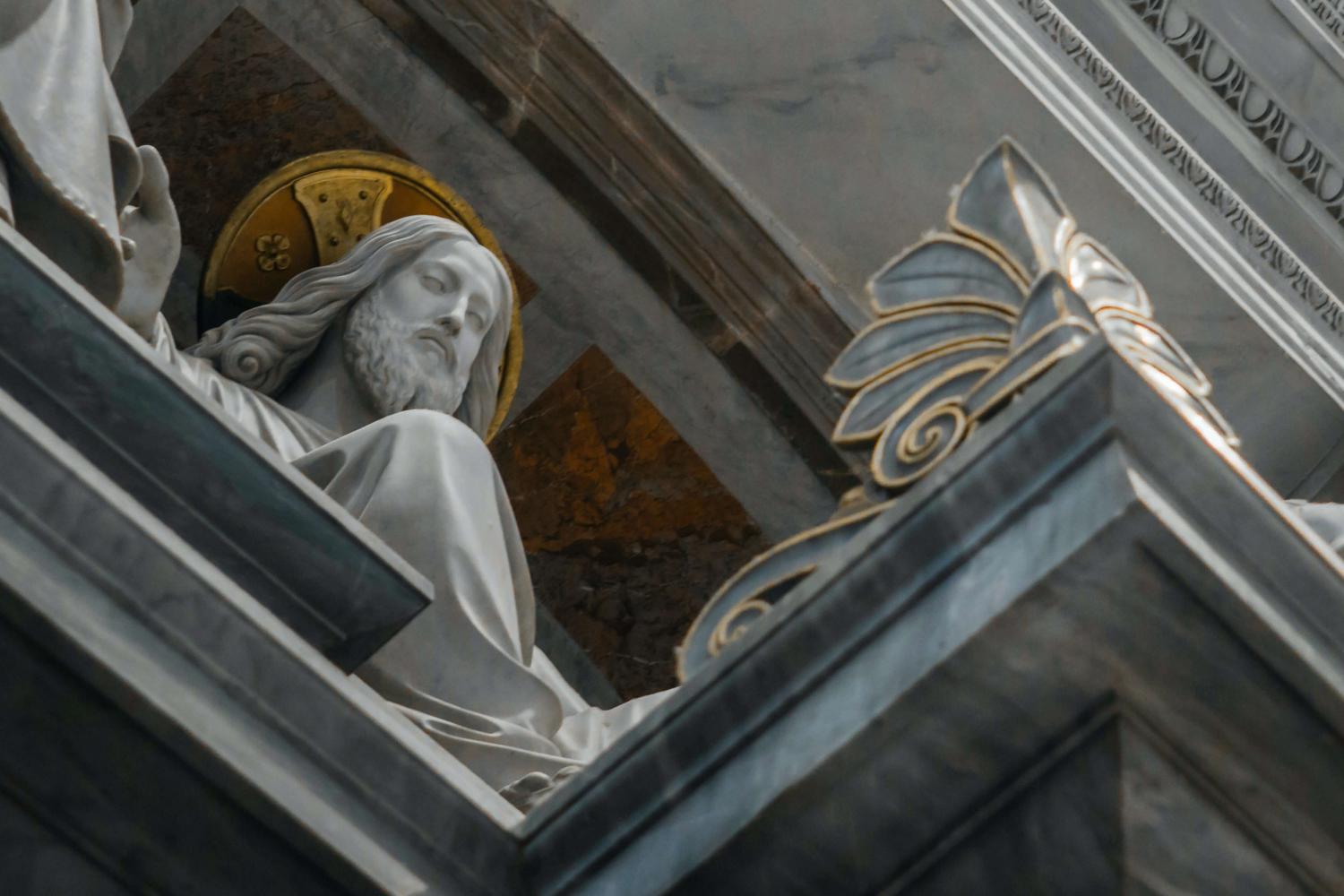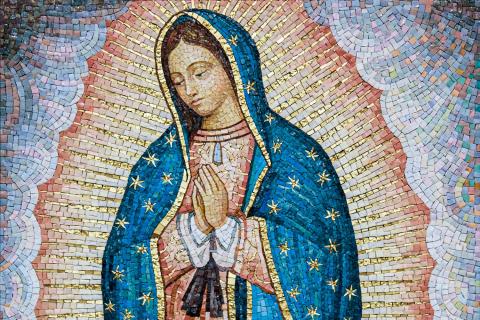
The following talk was given by Dr. Don J. Briel in 2017 to a gathering of young professionals at "Vespers at Lourdes" in Minneapolis, MN.
The basic problem of our condition as human persons is not that we are characterized by our faults, but that we are characterized by a great refusal. This is a refusal Father Edward Leen cast in relation to the problem of mediocrity.
We know from the Gospels that Christ says explicitly that we are made for perfection: "You must be perfect, as your heavenly Father is perfect" (Matthew 5:48). The Eastern Fathers, speculating on this widely, noted that we are called to Divine Life, that Christ came not to make us marginally better but to introduce us to and bring us into the Godhead. Perfection, then, is our destiny.
However, the response to that invitation has been, in so many of us, a mere tinkering with the spiritual life. We try to do better, we attend to religious duties, we attempt prayer more frequently and more fervently; and yet, we seem to miss the point of this great invitation.
Leen begins with the assumption that it is in the sacred humanity of Christ that we are to find the way to this Divine Life. He takes up the great image of St. Paul that the task of the Christian is to "put on the Mind of Christ" (Philippians 2:5). It is not so much the task of the Christian to do what Jesus did (as we say in the modern context, WWJD), but to think and relate as Jesus did.
Therefore, we should think together about this problem of spiritual mediocrity, the refusal to work out the perfection that has been the great invitation of Christ.
Leen says categorically: "We are a disappointment to God." But is this not inevitable? I suppose that when we look at that great invitation to perfection, we could assume it is hyperbolic, that it is not really Christ's intention that we truly strive for perfection, because perfection is impossible for us. Rather, he means that we should try to do better.
This is to make a mockery of Christ. He could not, as the Son of God, invite us to something of which we are incapable. The great mystery here is this: how can we think about the possibility of perfection in a way that would enable us truly to seek it?
The fact is, as any of us consciously would have to acknowledge, our lives tend to be superficial. They are essentially worldly, and we try to keep the basic pattern of that worldly existence and then to add a religious dimension to it. But adding this religious duty does nothing to change our lives fundamentally – it simply adds one more thing to an already crowded field. Leen argues, based on his reading of Newman, that our task is rather a transformation of life: true conversion, to put on the new man, to put off the old.
How are we to think about this?
We find, despite our frantic and fervent activity, that we have in the end done nothing, because nothing has been done to us. Life has not transformed us, day has succeeded day, and the years have followed the years; we have been alive all the time, but we have not lived. We sense that something is missing, we should be other than we are, and yet we find ourselves powerless to achieve it. Our essential problem then is not one of will or the passions; it is not that we are unwilling to convert (or not willing enough) or that our passions are too disordered. Our problem is that we allow our intelligence to be obscured as to the meaning and purpose of life.
To imitate Christ is not simply to imitate his exterior virtues, but to put on the mind of Christ. What does that entail? It is to imitate the interior dispositions of our Lord and to grasp the broad principles according to which he worked out his life’s task.
For most of us (C.S. Lewis treats of this in The Screwtape Letters) we tend to focus on a task, on something that is yet to be achieved. We try to have goals and try to achieve them. All that seems appropriate and fitting, but it places the future as being more important than the present, and just here is the great limitation.
As Lewis said, the future is the least perfect of times. The most perfect is the present, the second most perfect is the past, and the least perfect is the future. Think how much of our day is defined by anticipating the future, planning for the future, securing the future, making the future better. This is a source of anxiety, however, and it risks that we are not truly present to the life that we have before us. This is the key to understanding Christ’s mind.
Yesterday is gone. Tomorrow has not yet come. We have only today.
Christ is fully present, to the present moment, in every act of his life. Each thing that Christ had to do called into play the full moral and spiritual perfection of his soul, as if that were the only thing he had to do. He was fully present to the immediacy of everything that he did, and this is because his final task was not to seek to achieve anything, but to do the will of the Father. This is the central theme of Christ’s life and work: to do the will of the Father.
Christ saw that God’s designs were wrought out by the perfection in his attitude towards those events, rather than his being concerned with what he essentially achieved through his activity.
What about ourselves? Do we not tend to think that it is our achievements that ultimately matter, that what we succeed in accomplishing is what will secure our lives? Thinking in this way makes us largely indifferent to or removed from the immediacy of those things brought before us, on which our lives ultimately depend. Leen says, in a haunting line, that it was by Christ’s perfect docility to the circumstances that he revolutionized the circumstances. He allowed events to determine his actions rather than aiming at determining events by his actions. His life was a passion rather than an action, with more the nature of an endurance than a doing.
There is much at stake in this. Perfection cannot be achieved through doing, but through enduring. The perfection to which we are called is not that of achievement. If we look at Christ realistically, on any level of human experience, his life was a magnificent failure. The vast majority of those to whom he preached left him. The disciples whom he called, even on the edge of his death, betrayed him. They did not respond rightly. His message to the disciples he sent out was quite simple: if you go into a town and they do not receive you, go on. How do we explain this indifference, since he came to the world to save it? How do we understand the indifference, or apparent indifference, to the way the Good News is received?
Here is the great mystery. Because we are so preoccupied with achievement and doing, perfection seems literally impossible – and it is. However, when we think that our perfection lies in taking on the mind of Christ, seeing things radically differently, being present to those present circumstances which shape and define and limit us, then for the first time perfection is conceivable if not understandable.
Obviously, in his humanity Christ sought the achievement of his task, but he did not find in this the motive for his work. It is as if, again, he is entirely indifferent to the results of his ministry. To do things rightly, then, is to act as God wanted him to act, and it is only by that light that his life can be judged. The bending of himself to things – in his perfect pliability to change, his power of maintaining his disposition, perfect in every conjunction – seems to be the main aim and purpose of his life, rather than something positive to achieve.
To be a disciple of Christ is ultimately to take on this attitude. How would that shape a different understanding of what it means to live in a family, to work, to have a friendship, to pray? It changes everything. It is to make one’s whole life a kind of presence, instead of setting aside only set periods of time or formation to try to attend to one’s obligation to live an integrated life.
Newman argues that the vocation of life ultimately is only to be used to complete the will of God, not to seek to achieve or to form or to define. Christ’s life, in a word, intensively active as it was, really was perfect only in relation to things and in undergoing things, rather than a radical consequence of the things themselves. In this we see the sublimity of our Lord’s life and its grandeur.
The pattern of all human perfection lies in this triumphant vision. His kingship in hearts is exercised in a pilgrimage in which failure and continued agonizing effort under failure is the beginning, the middle, and the end. It is the case in the life of Christ and in the life of each of us, whatever significant achievements we have, whatever good we do, ultimately our life will fail. If we cling to ourselves as the measure of that failure, it prohibits that ultimate surrender, that undergoing of the passion, that enduring of the truth which is ultimately the nature of the Christian response to Christ’s message.
Perfection cannot be achieved through doing, but through enduring. The perfection to which we are called is not that of achievement.
Christ knew that he possessed the truth and he also knew that he expressed it in the way best adapted to the human intelligence. He knew how these truths, of which he was the expression, if accepted, would for his hearers solve the riddle of existence, satisfy the restless yearnings of their souls, and banish all unhappiness (if not all pain) from their lives. With that enormous consciousness, he comes to the world and is rejected by it. How do we make sense of this failure?
It is important to note that he used all the vast resources of his mind and of his soul to succeed, and yet he failed.
Life’s purpose is to purify us, not to gratify us. Life is not a theatre where we are called upon to play a brilliant part with a view to gaining the applause of the audience, nor an arena in which to achieve success and be greeted by the acclamation of the onlookers. It is rather a process whereby our souls are to be made strong with the principle of supernatural life. This is something, obviously, that we are incapable of doing ourselves. This inevitably involves what we would refer to psychologically as the humiliation of the ego, or the death to self which is a message running through the whole of the Gospel.
This reveals, then, the central role of the Cross as the image of hope. This humiliation of the ego cannot be accomplished without great pain and a bitterness to nature, from which we inevitably shrink. Yet this is the Cross: not some mere trifling of giving up of something, but the Cross, the center of promise and hope. This is the point of the humiliation of the ego, that triumph of failure, which waits for each of us who are willing to face the spiritual reality of the Good News of Divine Life.
Existence for the Christian is not a cozy fireside by which to sit and warm oneself but a furnace in which one is to be plunged in order to be refined as silver or strengthened as steel. This is especially true for those who are called by God to influence the lives of others.
This is, we will notice, at war with our nature. There is a natural tendency to build up those talents which have been given to us, to pursue that excellence we can easily achieve, and to gain the admiration of others in doing so. However, this is not the mind of Christ. For eventually, in each person, there will be a confrontation with a situation that, if accepted, holds forth the prospect of the humiliation and failure and ill-success of life. Nature shrinks from this, struggles desperately against this humiliation, and will seek every avenue of escape from it and will do everything to throw up some shelter for its self-love. This is the great escape, the great refusal.
Nature wants to keep life more or less as it is, to assure our own competence within it, to find success in influencing others for the good, and comfort us with the measure of our own self-esteem. This has nothing to do with the Gospel, however, and it has nothing to do with what the invitation to perfection would require.
We fear failure, we fear humiliation, we do everything we can to escape it, but the Cross, Christ himself executed as a common criminal, humiliated, exposed naked to the world, is the image of our hope. Do we believe it? If so, life must be about more than merely doing a little better every day and being a little less self-preoccupied. It is a full invitation to something much more radical.
The daily Cross, living rightly and well, striving to succeed but not making success the condition of our efforts, doing it because it is God’s bidding and not because it holds out the prospect of ministering to our egoism: it is only on this condition that our life will produce its transforming effect upon us and make us like unto Jesus Christ, who “for the joy set before him endured the Cross, despising the shame” (Hebrews 12:2).


